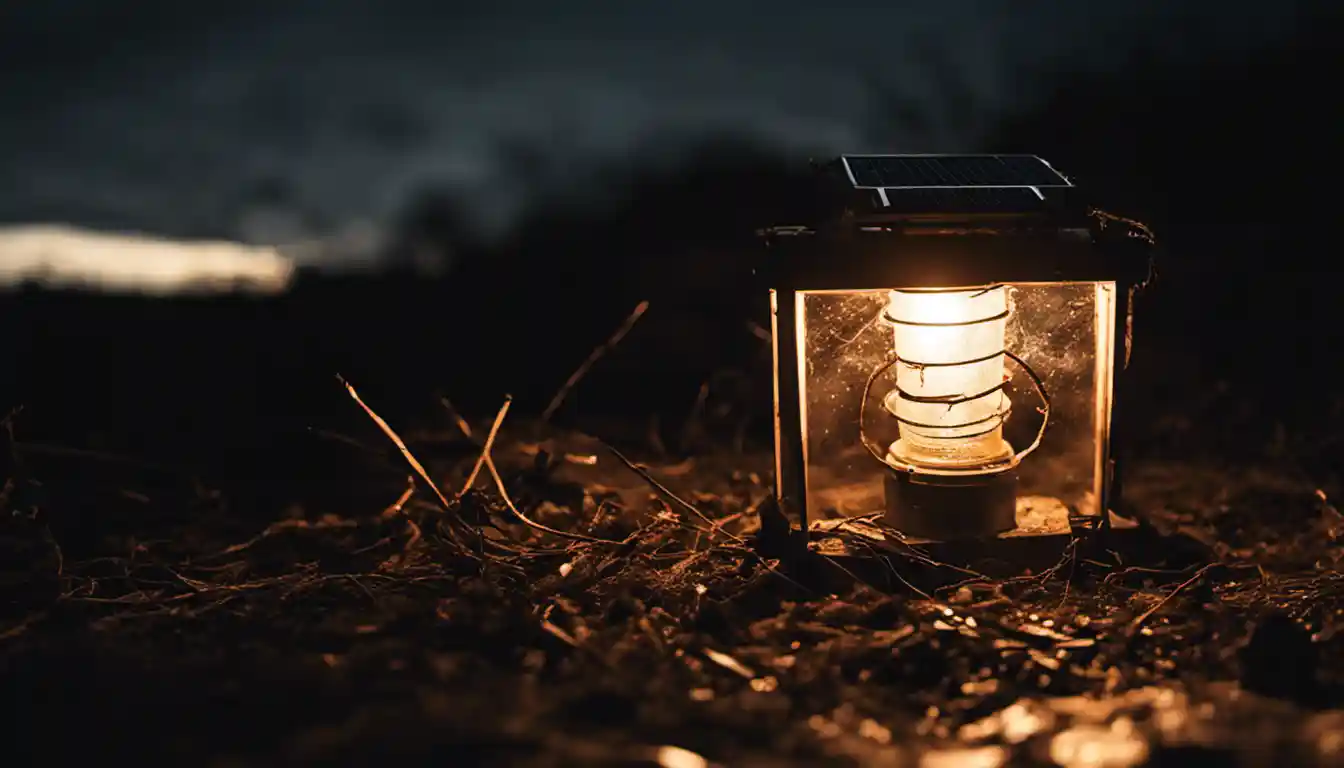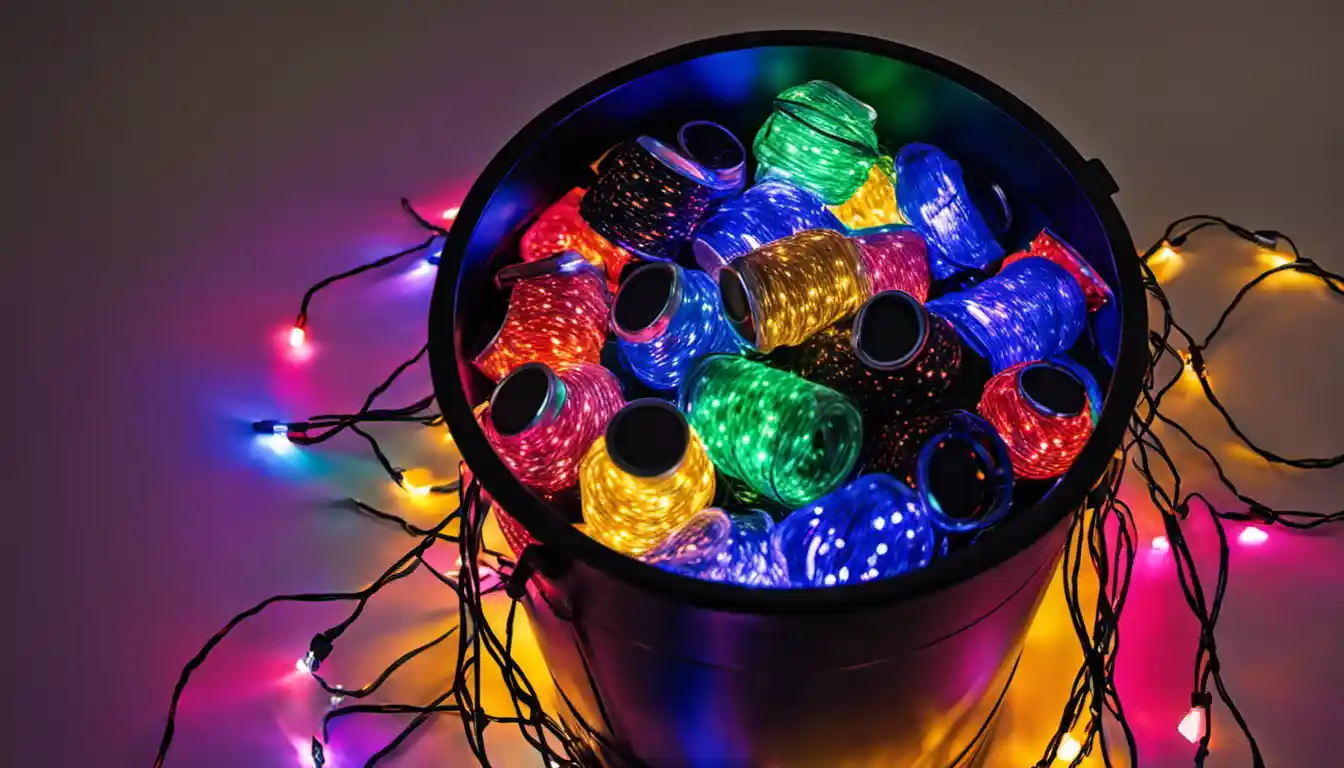Understanding Solar Lights and Safety Concerns
Solar lights themselves are not likely to catch fire as they utilize LEDs which are low-voltage, energy-efficient, and don’t heat up like incandescent or halogen bulbs. However, if there is a malfunction in the circuit board, wires, or battery, there may be a minimal risk of fire. This is extremely rare and solar lights are generally considered safe.
Can Solar Lights Catch Fire?
The question, “can solar lights catch fire?” is something that seems to come up amongst homeowners. The short and simple answer is that while it’s extremely rare, the risk isn’t zero. It is necessary to note that the solar light itself doesn’t pose a fire hazard. The bulb used in most solar lights is an LED, which does not generate much heat. However, the microscopic risk comes into the picture if the battery or the system that controls the electricity flow malfunctions.
Can Solar String Lights Catch Fire?
What about festive decorations – “Can solar string lights catch fire?” you may wonder. Just like regular solar lights, solar string lights are also generally safe. They usually employ LED bulbs which generate little to no heat, reducing the risk of fire. Nonetheless, ensuring the quality of the string and bulbs used, and using them as directed by the manufacturer is crucial.
Are Solar Lights Dangerous?
Despite the above, solar lights are not inherently dangerous. With the millions of solar lights installed worldwide, instances of them causing fires are extremely rare. While any electrical device carries a tiny risk, you’re far more likely to have a fire due to other reasons, like a gas leak or a traditional electrical short, than you are from solar lights.
How Do Solar Lights Work?
To understand the risk factors, let’s look at how solar lights work. These devices capture energy from the sun in a component called a solar cell or photovoltaic (PV) cell. The energy is then converted into electricity and stored in a battery. At dusk, when the PV cell stops receiving sunlight, a controller senses this and switches from charging the battery to discharging it, illuminating the light.
How Solar Powered Lights Store Power
It’s also worth noting how solar lights store this power. The battery, which holds the harnessed solar energy, is a critical component of a solar light.
NiCad (Nickel Cadmium)
NiCad batteries, one of the oldest rechargeable types, were popular some years back. Still, they can be harmful to the environment and often suffer from ‘memory effect,’ where they lose their maximum energy capacity if repeatedly recharged from a partially discharged state.
Lead Acid batteries
Lead-acid batteries, on the other hand, are known for their reliability and ability to deliver high currents. They are bulky and require proper maintenance and disposal due to the toxic nature of lead and acid used in them.
Li-ion (Lithium-ion)
In recent years, lithium-ion batteries have become popular due to their energy density, no memory effect, and light weight. However, issues with thermal management and faulty charging practices can make them prone to damage and, in rare cases, start to smoke or catch fire.
Factors Contributing to Solar Light Fires

The chance of any of these batteries causing a fire, in general, is incredibly slim. However, it’s crucial to note that like any electrical system, solar lights are not entirely free from potential risks. A couple of the factors that could contribute to solar light fires include:
Battery-Related Issues
Improper battery charging or malfunctioning circuitry could lead to battery damage. This can cause it to overheat, leak, or in very extreme cases, burst into flames.
Faulty Wiring
Faulty wiring or low-quality components can cause electrical short circuits. While an electrical short in a low-voltage device like a solar light isn’t likely to cause a fire, it’s still best avoided.
Safe Use of Solar Lights
Solar lights are designed for safe and trouble-free operation. However, it’s best practice to use them as directed by the manufacturer.
Can You Leave Solar Light On All The Time?
Leaving a solar light on all the time is safe. Built-in sensors automatically turn the light on at dusk and off at dawn. Unless these sensors malfunction, leaving the light on won’t pose a threat.
Is it Safe to Leave Plug-in Fairy Lights on all Night?
As for other types of lights like plug-in fairy lights, it is best to turn them off when not needed. It might not directly correlate with the topic of solar lights but it’s worth mentioning as often these types of lights are used interchangeably.
Is it Safe to Run String Lights Over the Pool?
Running solar string lights over a pool is generally safe, but always check the manufacturer’s instructions. Solar lights are designed for outdoor use and should handle a typical poolside environment without issue, but make sure they are installed securely and safely.
Prevention and Solutions
To further mitigate the risk, there are a few practices that one can follow.
How to Reduce The Risk of Solar Lights Catching Fire?
Following are a few tips on reducing the risk of solar light fire-
Be Wary Of Cheap Products

Cheaper solar lights can sometimes present more of a risk. They often have low-quality batteries or circuitry, so it pays to invest in a high-quality solar light.
Buy From Reliable Retailers And Trusted Brands
Purchasing from trusted brands and reliable retailers can ensure that the products you buy are safe, and that they have passed necessary safety tests.
Install Appropriately
Following installation instructions is also crucial. Keeping solar lights away from highly flammable materials and ensuring they’re in a position that they stay clear and dry can prevent accidents.
How to Protect Your Solar Lights from Fires
Protection measures include using compatible charging systems and adhering to specified charging parameters. Also, proper maintenance and timely replacement of the battery can keep your solar lights in good shape reducing any likelihood of damage.
How Do I Stop a Solar Light Fire?
If a solar light does develop a problem, unhook the battery and place it in a safe and fire-proof location away from flammable materials. If a fire starts, however, do not attempt to fight it yourself – call the fire department.
Solar Lights and Insurance
Solar Garden Lights and Your Homeowner’s Insurance
When it comes to insurance claims, solar garden lights rare cause of the damage wouldn’t typically affect your homeowner’s insurance premiums. However, in case of any electrical accidents caused by these lights – which are really unlikely, your insurance would cover it.
Disposal and Maintenance of Solar Lights
Maintaining your solar lights properly can extend their life and ensure they operate safely.
Why Do Outdoor Solar Lights Stop Working?
Outside factors could cause your solar lights to stop working. These include low sunlight exposure, dirty solar panels, and expired lifespan of the battery. Regular cleaning and maintenance can help prevent these issues.
How to Dispose of Solar String Lights?

The proper disposal of solar string lights or any solar lights for that matter is fundamental. Most components of the solar light fixture are recyclable. The PV cell on the light fixture and batteries, in particular, must be recycled properly due to the toxic elements.
Conclusion
So, can solar lights catch fire? The odds are extremely minute, almost negligible. Solar lights are designed to be safe and have a very low risk of causing a fire. They are a great way to lower your energy costs, reduce your carbon footprint, and add a charming touch to your home’s exterior. However, like with all electrical devices, there’s always a remote risk and precautions should be taken.
Final Thoughts
Solar technology has come a long way, and while any electrical device carries a minuscule risk of fire, solar lights pose even less of one. Quality solar lights are safe, efficient, and environmentally friendly. They serve as an essential part of what we can do to use sustainable and renewable energy. For more information about the benefits and practical applications of solar energy, feel free to visit our informative guide to solar panel lights.
Frequently Asked Questions
Are Solar Lights Safe to Use?
Yes, in general, solar lights are safe to use. They have been thoroughly tested and are used by millions of households globally without any issue.
Do Solar Lights Need Batteries?
Yes, solar lights need batteries to store the energy they collect from the sun during the day. At night, this stored energy is used to power the light.
Do Solar Lights Work in Cold Weather?
Solar lights work in cold weather as long as they receive adequate sunlight during the day. However, battery performance can be reduced in very cold conditions.
How Long Do Solar Lights Last?
Solar lights can last between 2 to 4 years, depending on the quality of the product and its usage. The batteries, however, may need to be replaced every 1 to 2 years.
Can Solar Lights Explode?
Solar lights cannot explode. However, a faulty battery, under very rare circumstances, might burst or leak.
Do Solar Panels Ever Catch Fire?
Solar panels are generally very safe, but there have been rare instances where poorly installed panels have caused fires. These instances, however, are few and far between, and the industry has learned from them to improve safety standards further. If you install your solar panels correctly and maintain them well, the risk of a fire is incredibly low.
So, invest in some quality solar lights and enjoy the numerous benefits they bring, safe in the knowledge that you’ve taken every precaution to mitigate the almost negligible risk they pose.



